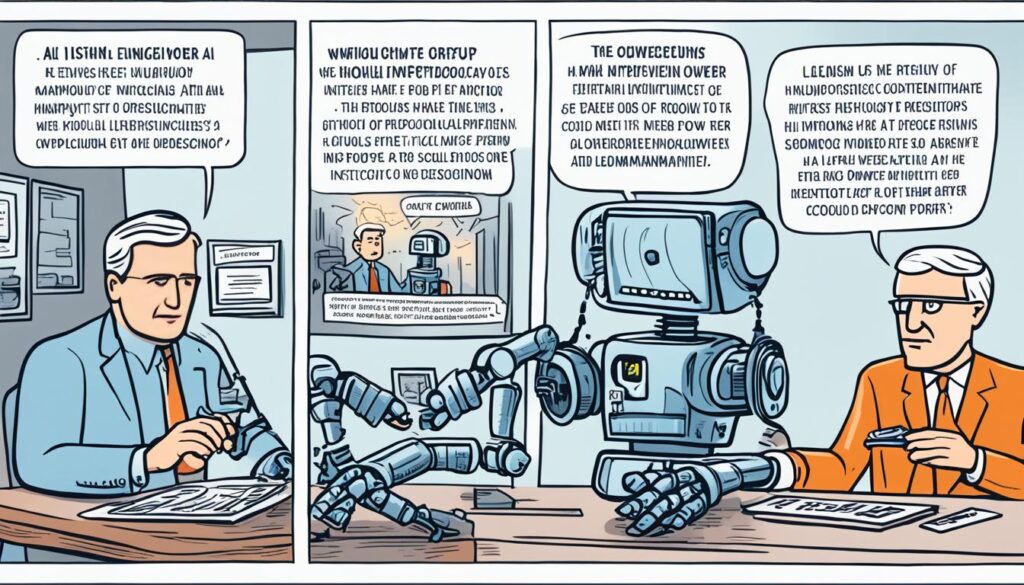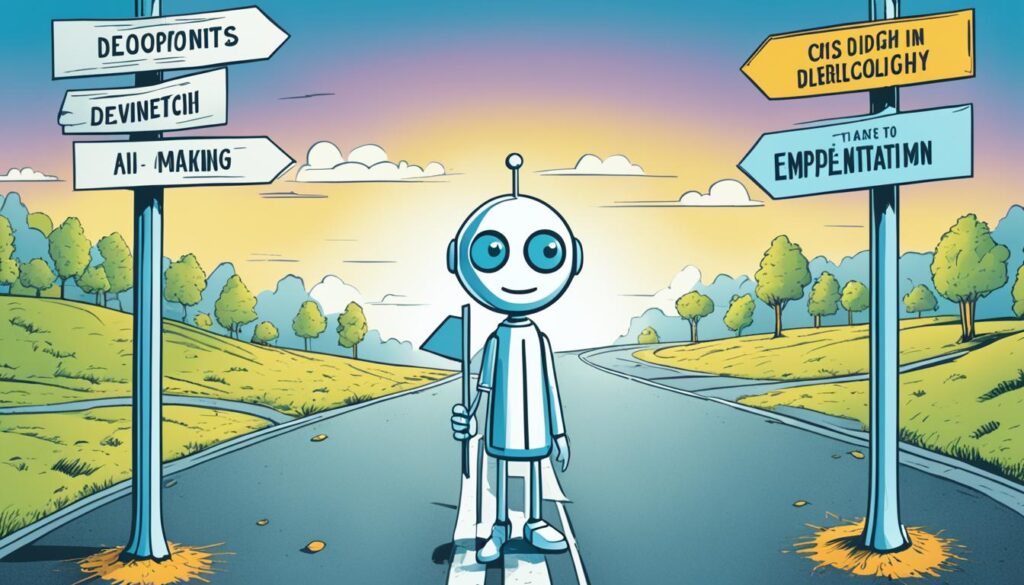Did you know that nearly 42% of companies used AI in 2020 according to McKinsey & Company? This highlights how fast AI is making its way into our daily lives. AI’s introduction has brought a host of new ethical issues. These include concerns about privacy, bias, being open about how AI works, and being accountable for its actions.
Essentially, AI involves creating systems that can understand language, spot trends, and decide things. But, it’s important that we keep an eye on these systems. We need to make sure they’re making fair choices and protecting human rights.
The use of complex AI is expanding. It’s being used in healthcare, social media, and even in our courts. This means ethical guidelines are essential to make sure AI treats people fairly and avoids making society worse. Bringing together many different people and setting strict rules is crucial. It helps make AI that acts responsibly, can be trusted, and brings benefits to all.
Fundamental Principles of AI Ethics for the Middle-Aged
Being in the middle of life means facing new challenges with AI. It’s key to know the basic ethical rules to help AI grow in ways that benefit everyone. These principles are our guide to make AI that serves people well.
Respecting Human Rights and Freedoms
AI should always respect human rights like fairness and equality. Following these rules protect our dignity when AI is used around us.
Compliance with Applicable Laws
AI must obey the law to be used in the right way. This makes sure it works with our values, earning our trust and being reliable.
Transparency and Accountability
Since AI can sometimes be unclear, we need to see what it’s doing and who’s responsible. Sharing how AI works builds trust and lets us keep watch over it.
Mitigating Bias
It’s vital to fight bias in AI. Choosing data carefully and keeping an eye on how AI learns can make its decisions fair for everyone.
Prioritizing Human Judgment
Deciding when to trust AI or human judgement is important. We should let humans lead in big decisions. This helps AI support us instead of taking over.
Implementing Rigorous Security Measures
Keeping data safe is critical. The right security steps protect us and make AI’s development ethical. This ensures AI can be trusted.
Following these ai principles lets everyone understand and use AI ethically. It paves the way for AI that respects people and the law.
Addressing Ethical Risks in AI Implementation
Artificial Intelligence is changing our world fast. But, as it gets used more, big ethical questions are coming up. We must address these risks to keep AI systems reliable and good for everyone. The risks include things like privacy issues, misuse of data, and biases in the computer algorithms. Solving these issues is key to making ethical decisions in AI and understanding AI’s ethical impact.

Ethical Risks in AI
AI poses some major ethical risks. For example, it can invade our privacy by using personal data without permission or the right safety measures. There’s also a risk of unfair biases coming from bad data or wrong designs in AI. These biases can make existing problems worse and lead to unfair treatment of people.
Strategies to Address Ethical Risks
To tackle these risks, we need strong strategies. It’s crucial to watch over how we collect, store, and use data. Having diverse teams and data can help spot and fix biases. Open talks and following strict rules are also vital. These steps make sure AI is used ethically and for the common good.
Trustworthy AI: Guidelines and Key Requirements
Creating trustworthy AI is all about following clear rules for lawful and ethical conduct. These guidelines help create AI that works well, is ethical, and can be trusted.
Lawful and Ethical Practices
Sticking to ai ethics guidelines means valuing legal and ethical behaviors. This ensures that AI meets rules and stays morally sound during development.
Technical Robustness and Safety
AI’s technical strength and safety are key. They require thorough testing to work well in all situations. This approach lowers risks and builds trust in your AI solutions.
Privacy and Data Governance
Ethical frameworks for AI development include privacy and data rules. By protecting data with strong steps, you keep users’ privacy safe. This approach boosts trust.
Transparency in Data and AI Business Models
Being clear on data use and AI models boosts consumer trust. People want to know what data you collect and how you use it. This honesty builds trust and meets ethical standards.
Avoidance of Unfair Bias
To not spread unfair biases, AI design must be fair and inclusive. Using varied data and removing biases supports ai ethics guidelines. This promotes fair results.
Societal and Environmental Impact
Think about AI’s impact on society and the environment. Looking at these aspects can help AI grow sustainably. It aims to make a positive change without harming society or nature.
Accountability and Responsibility
It’s important to know who is responsible for ethical breaches in AI. Sharing responsibilities at different AI stages maintains high ethical standards and trust in AI.
Assessing Trustworthy AI: The Assessment List
Evaluating how trustworthy AI is, we must be thorough. The goal is for AI systems to help people, not take over. We need to ensure humans always make the final decisions.

Human Agency and Oversight
Putting people in charge is key. AI is meant to support us, not replace our judgment. It’s vital to include ways for humans to keep an eye on AI.
Privacy and Data Governance
Having strong rules for privacy and data is a must. This protects people’s digital rights. It also ensures AI respects ethical standards through clear and secure practices.
Non-discrimination and Fairness
We must check AI systems to make sure they are fair. This stops them from making social biases worse. Following key ethical rules is crucial.
Societal and Environmental Well-being
We need to look at how AI affects society and the planet. The aim is for AI to help people and not harm the environment. It should follow ethical guidelines broadly.
Expanding Ethical AI Practices
For AI to stay ethical and helpful, we must grow our ethical practices. This means everyone involved in AI, from its makers to how it’s used, has to focus on ethics.
Diversify the AI Workforce
Having a diverse group working on AI is key. It brings many viewpoints together. This helps create AI that’s fair and includes everyone. We need to hire from different professional and cultural backgrounds.
Involve Stakeholders Throughout the AI Lifecycle
It’s important to hear from many different people when working on AI. This includes experts and those affected by AI. Including their viewpoints makes AI better meet ethical standards and societal needs. This way, we address AI ethics and build more trustworthy tools.
Implement Transparent and Explainable AI Models
Making AI models clear is crucial for trust. When everyone can understand them, it builds trust. This step also connects AI to ethical standards. It makes AI more open and reliable.
Prioritize User Consent and Data Protection
Protecting user data and getting their consent are ethical musts. It’s about respecting people’s privacy. Following strict data rules is key to keeping their trust and obeying laws.
Embrace Sustainability and Societal Impact Assessment
AI should be good for society and the planet. This includes looking at how our AI affects people and the environment. These checks help ensure our AI does good, without causing harm.
